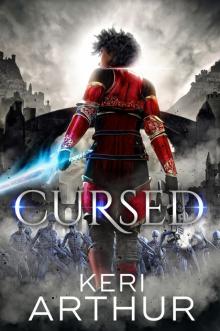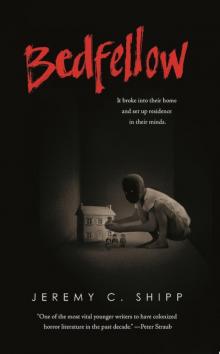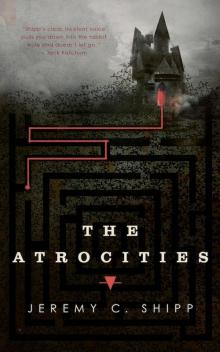- Home
- Jeremy C. Shipp
Vacation Page 5
Vacation Read online
Page 5
He heads over to the corner of this small room of sorts, and rustles through some plastic boxes. When he comes back, he’s holding a handful of pills, shapes and sizes galore. “Trust me when I tell you this, you need these.” I don’t take them, so he sets them beside me, on a dresser. One of them rolls off, into the dirt. “I’ll go get you some veg and water. Sit on the bed if you want.” He leaves, just like that.
He comes back, and I’m still standing in the same spot, with the same stupid look on my face. I know, because there’s a mirror in front of me. He holds out a plate of vegetables. I don’t take it, so he sets it beside the pills. Then he picks up the fallen pill and blows it off. He adds it to the pile. He points. “When you take that little one right there, hold it under your tongue or it won’t do shit.” He turns around. “That reminds me, I gotta go take a dump. I’ll be back and we can keep working.” And he leaves again.
The woman and this guy, they’re treating me like I’m a guest here. Like I’m not going to go nuts and attack them.
And I don’t go nuts.
And I don’t attack them.
And I wonder if there’s something wrong with me.
When Odin isn’t here giving me vegetables or eggs or water or white gunk to rub all over my body, I’m serving my time in solitary. No, this chamber they’ve given me isn’t a prison cell, but I treat it that way.
I feel like a villain.
Every time on the chamber pot, a new type of minion squiggles from my ass. There’s the black eggs, and the clear little squids, and the furry yellow balls, and the foot-long sac, and the angel hair pasta, and the red gummyworms, and the brown spiders, and I don’t know how much of this is me demonizing all my crap, and how much is real. But whatever these sick little bastards are, they remind me of Krow. She had attachments to her body that she never wanted or asked for.
I wonder if she keeps them in a jar.
I’m happy to throw mine away.
But the bad things don’t just leave through my ass. They attempt to squeeze out my pores, and ravage my skin in rashes and hives.
My muscles spasm.
My eyes twitch.
My body can’t sleep when I want to sleep, then my body can’t stay awake when I’m tired of the nightmares.
I wonder if Frankenstein’s monster was zapped to life, like in the movies, or if the process took days.
I wonder how long a body can last not quite dead and not quite alive, before it has to succumb to one path.
I wonder if I care which way I go.
But then things change. I change. Not the way I changed into a Tourist. This is a change I haven’t chosen.
When I realize how many hours I’ve gone without pax, I can’t keep my mouth shut anymore. “What are you doing to me?”
“Nothing much anymore,” Odin says. “You’ve leveled out pretty good. Just keep eating the veg and eggs, and you’ll be alright.”
“What am I on”
Odin shakes his head. “What you’re feeling right now, man, is what I like to call normal. It’s how you’re supposed to feel.”
This isn’t normal. I say so.
“Think of it this way, dude. If you live your whole life with a nail in your head, I mean since you were a baby, since you were born, then it won’t feel like there’s a nail in your head. You’ll just feel normal, right? And everyone else’ll think it’s normal, cause they’ve all got nails in their heads too. But that’s not normal. That’s fucked up. And you, man, you were fucked up.”
“What do you mean fucked up?”
“All the bad shit in your body, combined with all the good shit not in your body. Makes a bad case of toxic avenger. But like I said, you’re getting back to normal.”
So this is what normal feels like.
I want to thank him.
And I want to kill him.
But I settle on neither.
The woman Noh, whose name I learned from Odin, stands in the mouth of my room. She’s dressed in the same overalls, though cleaner. She lingers there, fidgeting with her suspenders, as if waiting for her first prom date. Despite the circumstances, I can’t help but notice how beautiful she is.
“I realize it isn’t quite my turn yet,” she says. “But there’s something I need—I want to tell you. Is that a problem?”
I respond only by looking at her bare feet.
“It is commonly believed that human history has been inundated by warfare and aggression,” she says. “While this is true to some extent, most people hold the belief that the farther you look back into history, the more brutality you’ll find. This simply is not the case. Most of the ancient battles, especially the tribal battles, were less focused on mortal combat than the ruffling of feathers, as it were. I don’t know if you’re aware of this already, but it’s been theorized that less than 10 percent of warriors in the Civil War fired their guns. Even fewer aimed them when firing. In World War II, the guess is that 15 to 20 percent fired their weapons. In the Korean War, the number was up to 55 percent. In Vietnam, 90. Now it seems as if every American man, woman and child alike is capable of pulling the trigger, if they deem it justified. Justification used to not be enough to kill another human being. This being said, it means a lot to me that you haven’t attempted to murder me and my companions. Your actions, or lack of, speak a lot about your character. Thank you.”
Part 8
This is Don Quixote’s psyche.
This is TS Eliot’s Wasteland library.
This is Mrs. Dalloway’s party, if she were really Virginia Woolf.
This is Noh’s room.
Towers of books and notebooks clutter every available surface. Fallen ruins of paper conceal the bottom half of her bed, and I image her asleep on the top half, curled up, fetal and afraid.
Instead, she’s cross-legged on a chair, with a photo album in her lap. She motions for me to take the chair across from her.
I do.
“The detoxification has been successful, I assume?” she says.
I shrug, but it’s a lie.
“Do you feel like buying anything?” she says.
“What?”
“At this moment, do you feel the urge to buy anything?”
“No.”
She smiles a little. “It’s not only the pharmaceutical companies that benefit from poisoned bodies, it’s every commercial entity. A healthy body is less likely to succumb to compulsion. Anyway, the name of this step you are about to participate in is indoctrination. You should know that learning requires that the student be receptive of the teacher. And let’s face it, you aren’t going to listen to what I have to say. I don’t blame you. And even if you did somehow heed my words, you wouldn’t accept them. Human beings have an uncanny ability to deny and to forget ideas that don’t coincide with their own viewpoint. To impart unwelcome knowledge is the same as forcing a revolution in a country that isn’t your own. It doesn’t work, unless the process starts from the inside. Therefore, my position will be to act as a guide. To point you in the right direction if and when you find yourself lost. Everything else concerning this indoctrination will be your own doing.” Her dirty fingernails trace along a flower etching on the photo album. “In order to succeed in the indoctrination process, you must answer one question. The question being, what is the true purpose of the Vacation? This is one of those simple-sounding inquiries like that of a child. However, such questions as ‘Why is the sky blue?’ are often times the most difficult to answer. So take your time.” She folds her hands on the album and stares at me. “Begin when you’re ready.”
The more time passes, the more uncomfortable she looks, and the more uncomfortable I feel.
I wonder how many people convert to another religion or change political parties or restructure their ideologies simply because of pity or because they want to be polite.
“I don’t know what to say,” I say.
“Start with the knowledge you already have. What do you know about the Vacation? What is the Vacation?�
��
“The Vacation is an all-expense paid, one year tour around the world for every citizen.” Somehow, I want to say more. I want to impress her. “All-expense paid is a misnomer. By and large this is tax-money we’re talking about. And we do have to wear these stupid ad shirts almost every day.”
“And why is it, Mr. Johnson, that the citizens are only allowed one year to travel globally?”
“Taking turns and limiting our time in various countries is the only way to manage international travel in a world as overpopulated as ours.”
“I see. Now, you’ve already mentioned the ad-wear. It may be pertinent to consider who else might be benefiting from the Vacation system.”
“Well, the most obvious beneficiaries are the vacationers themselves.”
“How do they benefit?”
“That’s not something I’d care to generalize. Everyone has their own reason for leaving.”
“An interesting choice of words. If you can’t generalize, then perhaps you can specify your own reason or reasons for leaving. What did you hope to accomplish on this trip?”
This is a simple enough question, and therefore requires a very complex answer.
If I open myself up, and tell her my feelings, then I’d be connecting this reality to my old real reality.
I tell myself the insanity of this situation is the reason I don’t want to tell her why I went on Vacation.
I tell myself that, because I don’t know why I went on Vacation.
And maybe, just maybe, I don’t want to know why.
She looks at me like the teacher I always wanted to become.
Should I speak, like Marvin would?
“I wasn’t happy with my life,” I say, feeling both defeated and victorious. And this combination is surprisingly calming. “I went on Vacation because I wanted to find myself.”
“What exactly does that mean, find yourself?”
“I don’t know.”
“Perhaps the more telling question would be, have you accomplished your goal? Have you found yourself?”
I shrug, and I’m not lying.
“What kind of person would you like to be when you return home?” she says.
“I want to know that I’m capable of more than I assumed.”
“And you don’t know this yet?”
“No.”
“But, Mr. Johnson, you went to New Zealand. You had adventure after adventure. You’ve proven your courage on more than one occasion. And yet now, you don’t feel capable?”
I almost laugh. “Jumping out of a plane doesn’t make you a courageous person.”
“It doesn’t?”
“My girlfriend back home, she’s an adrenaline junkie. She’s been that way ever since she went on her Vacation. But believe me when I tell you this, no matter what kind of crazy stuff she does with her free time, she’s not courageous. She looks down on me because I’d rather read a book than ‘live the book’ as she calls it. She’s not happy unless I take her out. She doesn’t enjoy sitting at home and talking. She doesn’t really like me.”
And I realize where I am, and who I’m talking to.
I wonder if this is how psychologists work.
I shudder. “Perhaps the point of the Vacation is to erroneously teach people what courage is. Showing us how to have adventures on their terms.” And I’m surprised that I’m already talking the way these people do. Us versus them.
“Why would they want that? Would true courage be a threat to them?”
“It could be, in the wrong hands. Courage is a tool of both good and evil.” As I say this, I recognize how courageous this woman really is. Despite her awkwardness and her worried mannerisms and her tiny voice. The fact that she’s living here this way means she’s more courageous than I could ever hope to be.
“How would you use your courage?” she says. “For good or for evil?”
“It’s not so much that I’d use it for any specific purpose. I don’t have any enemies.”
“Then what’s the point?”
“The point is…” And it takes a lot of courage for me to admit this. Even to myself. “If I were courageous, I could stop being so hard on myself.”
“What reason do you have to chastise yourself?” she says.
“Whatever reason I can think of.” You see, I was wrong when I said I don’t have any enemies. “I don’t feel like I deserve what I have. My house, my job, my girlfriend, my gold. I work as hard as I can, but it doesn’t seem to matter. I feel that if I weren’t my father’s son, I wouldn’t have any of it.”
“Would you?”
“Probably not.”
“So let’s imagine that you were an orphan, and you managed to work you way to this point in your life with all that you have, and no one helped you along the way. Would you still feel guilty?”
“Yes,” and I’m shocked by the answer. “It’s not just a matter of my father. There are people out there who live in poverty. But that’s not the worst of it. The worst part is that I’m not happy with what I have. I want more.”
“This courageous person you want to become, he wouldn’t feel guilty?”
“Maybe he would. Maybe there’s no way around it. But he’d be strong enough to do what it takes to make himself happy. No, not strong enough. Selfish enough.”
So this is him.
The selfish bastard I really am.
Noh sets the album on the ground. She walks over to my side, and puts her arm around my shoulders. She has to squat a little to accomplish this, as the chairs are low. “You’re not the bad person you think you are, Bernard.”
I want to tell her to let go of me, and I want to tell her to hold me tighter.
“Imagine,” she says. “Imagine that in your childhood you’re pierced or tattooed or beaten or secluded from your family for a period of time. After this event, you’re everything you ever have to be. There are no commercials to tell you what you need, because you already know. No one ever questions your worth, because you’re complete. You’re human. This is the life you deserve, Bernard.”
And this dirty angel has brought me to tears.
She returns to her seat. “I fear I’ve allowed us to stray far from the true answer to my original question. Your train of thought was intriguing and I wanted to see where it would lead. This isn’t to say I’m disappointed with the outcome. Quite the opposite. However, it’s about time we get back on track.”
I smear snot onto my sleeve.
“Truth be told, there are various purposes for the Vacation,” she says. “But the one we’re looking for, what I referred to as the true purpose, it’s the strongest driving force behind the decision to implement the Vacation program. This you have yet to discover.” She holds out the album. Her arm muscles aren’t small, but the album still vibrates in her hand, due to its weight.
I take it.
I open it.
These photos, I don’t want to describe. Not because you’re my parents, and I want to keep you from this specific suffering, but because I want to keep myself from suffering again. Even now, as I’m writing this, as I’m attempting to block out the images, they’re popping and bursting inside me. I see the faces. I see the eyes.
“What is this?” I say.
This is everything Mary Shelley’s monster did that she was too afraid to write down.
This is Hemingway’s shattered romanticism.
This is Mr. Hyde’s nightmare.
“This is the world,” she says.
There’s something worse than being tortured in hell.
It’s being in hell, and left alone to watch.
And I thought I knew guilt.
I’m sitting on my bed when a banana peel flitters through the mouth of the room onto the ground at my feet. Then an old woman creeps inside. Her hair is a rainbow explosion with a different color for every spike. Her skin’s as wrinkled as mine.
She hobbles over to me, and I raise my hand and open my mouth to warn her, but by then it’s too late. She s
lips on the banana peel.
“Ah! My hip!” she says.
“Oh god, are you okay?” I say.
She sighs and stands, and brushes herself off. “You were supposed to laugh, honey.”
“What?”
“It’s called comic relief. God knows you need some right about now.” She pockets the banana peel and hops down onto my mattress. “The name’s Laetitia.” She holds out her hand.
I take it, and my hand vibrates a little.
She points her palm at me. Hand buzzer. “Alright, so you’re not a fan of the classics. I’ll make a note of it.”
“My name’s Bernard.”
“I know.” She pulls out a pad of paper and something small and black. Charcoal maybe. She starts drawing. Her eyes jump up and down. “I also know how you’re feeling. Because, honey, we all felt that way at first, like we don’t belong here. But that’ll change, if you stick with the program.”
“I doubt that.”
“So did I. So did all of us. Because growing up, we all label each other, and we label ourselves. We think we know our definitions and our limitations, but we don’t. We work our asses off to be the person we think we’re supposed to be, but the fact that we have to strive to be normal proves that we’re not. Honey, you haven’t the foggiest the man you could become.”
I think of Krow and her transformation.
No. I’m not that strong.
“I’ll tell you what works for me,” she says, and her eyes still keep the beat as her fingers dance on the paper. “Humor. Humor’s a powerful weapon, and the fact that it’s underestimated is part of its power. Don’t demonize the enemy. Satirize him. When you make fun of an aspect of society, its authority is lost, and people will be more likely to change the way things are. The same goes for you. Laugh at yourself, and you’ll be better prepared to see yourself in a new light.” She flips the paper around.

 Vacation
Vacation Cursed
Cursed Bedfellow
Bedfellow The Atrocities
The Atrocities Sheep and Wolves
Sheep and Wolves